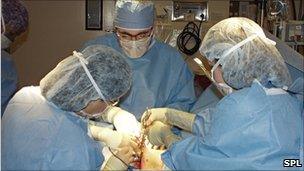Middle aged 'miss out' on cancer surgery
- Published

Surgery rates drop with age says report
People are less likely to get some forms of cancer surgery once they enter middle age, say researchers.
A report, external by the National Cancer Intelligence Network shows the percentage of patients being operated on in England fell with age.
The author said the drop in surgery rates in people as young as 50 was a cause for concern.
The Department of Health said there was no place for age discrimination in the NHS.
The report analysed hospital data on surgical operations designed to remove a tumour between 2004 and 2007.
In ovarian cancer the percentage of people having surgery went from 82% for patients in their 40s to 26% for the over 80s.
Between the same age groups, the proportion for kidney cancer went from 78% to 29% and from 58% to 10% for cervical cancer.
Concern
In an blog, external, the lead author Dr Michael Peake, said: "Our report shows that surgical rates fall off steeply with the age of patient treated. And while this isn't intrinsically surprising, the drop in some cancers begins in age groups as young as the 50s. This is a cause for concern.
"Crucially, it raises questions about the underlying reasons for these variations and, in turn, what can be done to reduce them."
The report does not conclude that the drop off is as a result of bad practice. It does not take into account how advanced the tumour is, which would reduce the likelihood of surgery, or whether patients decided not to have surgery.
Sarah Woolnough, director of policy at Cancer Research UK, said surgeons must take notice of the report and analyse their practice as cancer outcomes in the UK were not as good as the rest of the world.
She told the BBC: "There could be very good clinical reasons for the trend, but it does reinforce the idea of a cultural bias against treating older people."
The Care Services Minister, Paul Burstow, said: "Our population is ageing as more of us live longer - and there can be no place for age discrimination in the NHS.
"Eliminating inequalities in access to surgery is vital if we are to improve cancer survival rates.
"We recently launched a new cancer outcomes strategy that sets out the direction for improved cancer care and aims to save an additional 5,000 lives a year by 2014/15. This will not be achieved unless the NHS tackles inappropriate variations in surgical intervention rates for cancer patients."
Rates of surgery also vaired by regions. Dr Peake highlighted lung cancer treatment in which rates are much higher in the East Midlands, Birmingham and Merseyside than in Lancashire, Sussex and Essex.
- Published9 February 2011